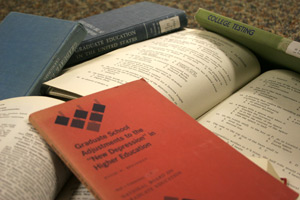
As the spring semester gets underway, freshmen are still adjusting to the not yet brutal winter at Binghamton University. Sophomores are beginning to realize they have to declare a major within a few months, and juniors and seniors are starting to feel the reality of graduating from their comfort zone at BU. With this reality in mind, many students ask themselves, “What am I going to do next?”
For students like Erin Hauck, a senior majoring in economic policy analysis, graduate school seems like the natural progression in their education.
“I put together my resume last year and have been updating it since,” she said. “Everything else I needed to do for graduate school, I didn’t start putting together until last semester, which was late I felt.”
Many students do not begin to think about graduate school until junior or senior year, but waiting until that point may put students at a disadvantage. Procrastination can be especially damaging when asking for professor recommendations, a staple in any school or internship application.
“All of my recommendations came from professors I’ve had in the past year,” Hauck said. “It can be intimidating to get to know the professor if you have a really big class, but if you make the effort early you won’t have any problems.”
Nancy Paul, director of the Career Development Center (CDC), also encourages a proactive attitude in applying to graduate school.
“Set a career goal, and see if graduate school will help you achieve that goal,” she said. “As sophomores and juniors, students should get experience and explore different careers to see what they like, and to build their resumes.”
However, Paul stressed how imperative it is to evaluate whether graduate school is the right path for you, as both an individual and student. Do not go to graduate school for the sake of continuing your education without a focus, or because of peer or family pressure, she advised, adding that students should ask themselves if the advanced degree will apply specifically to their career goals.
“It’s great to have career goals as a freshman, but test them and check out other things too,” Paul said. “Don’t have tunnel vision; everyone is different in terms of having clarity as to when graduate school is the next step.”
Applying to graduate school is a serious decision, and Paul has seen students make serious mistakes in the process.
“Often students set narrow geographical parameters too early, when graduate school in a place like the Midwest might be the best for them,” she said. “Students also immediately rule out schools they think are too expensive without realizing that many of the expensive schools offer grants and scholarships.”
Whether students are sure graduate school is their next step following BU, or are unsure as to when or if they want to work toward a higher degree, the CDC is located in the Glenn G. Bartle Library basement and staffed with counselors to assist and guide students through the process.
“It’s important for students to ask themselves the tough questions, such as ‘Is graduate school really what I want?’” Paul said. “If you don’t know, the CDC is here to help.”


